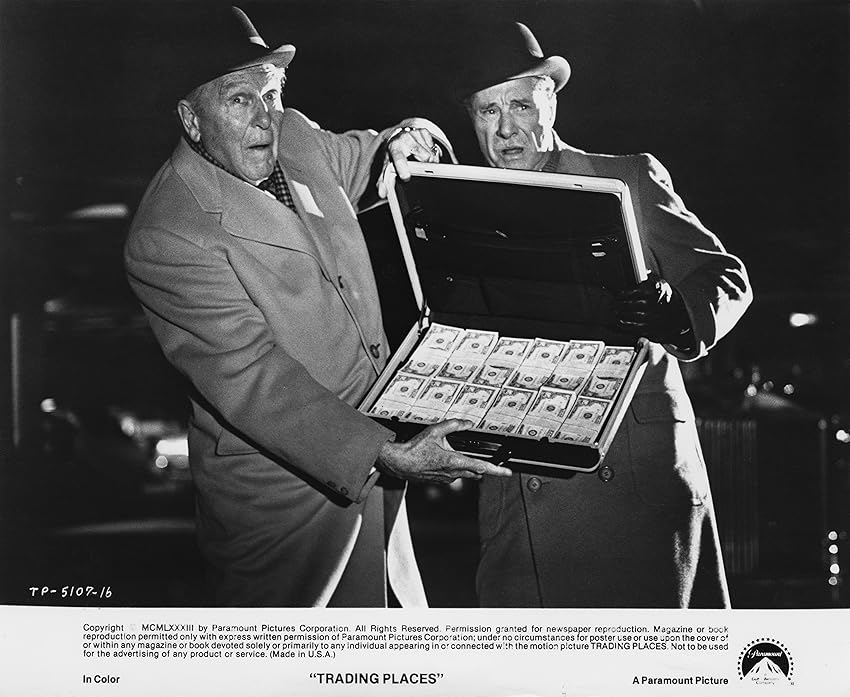
Unpacking the Comedy of Social Class: A Review of Trading Places
Trading Places is a story of an overprivileged Craps a stockbroker and a natural-born con man Billy Ray Valentine who has learned to survive in the Duncan streets who wake up one morning and are told that they have been switched roles by Mortimer and Randolph Duke just for fun to find out how environment influenced them. The Dukes like to toy with the social hierarchy as the film presents Louis and Billy Ray having to deal with new issues and territories, making it a very funny comedy with insightful message of social structure and received personality. The piece is successfully hilarious while at the same time being rather socially conscious. Complementing the humor is the irony and ruthlessness of the jet set way of life juxtaposed with the resourcefulness and tenacity of the most unlikely heroes for a delightful blend of humor and a conscience tugging at the audience’s heartstrings.
Both Eddie Murphy and Dan Aykroyd as Billy Ray’s and Louis’ respectively produce a fitting comedic timing. The principal sources of the show’s comedy are Murphy’s personality and Aykroyd being transformed from self-satisfied to desperate. The performances of Denholm Elliott and Jamie Lee Curtis are a big plus as far as the acting is concerned, and Curtis provides a nice touch to the plot as Ophelia, who helps Louis in his hour of need. The cast gives powerful and deserved performances for their roles, which adds to the satire of the movie.
Trading Places itself is a well-directed comedy film by John Landis where he brought his talent on humor and believable storyline that talks about class struggle. In each segment, Landis succeeds in presenting a humorous and memorable message viewers can still take to heart today. His direction makes each of the comedic moments effective and never strays away from being a commentary on society.
Elmer Bernstein’s score supports the comedy and the drama perfectly. It uses music in both light and serious scenes as the film’s accompaniment and further helps to add emotion to the audience during the entire process of the film’s drama. The beautiful picture painted of 1980s Philadelphia is a backdrop that heightens the social inequalities as depicted in the movie. Robert Paynter, a director of photography does an Excellent job in pitting the streets against the glamour, which completes the irony of the film.
The set in Berry’s film is tastefully done in capturing the differentiation of the classy and low class society. Whether in the opulence of the Dukes’ offices and homes or the rather grime portrayals of street life, every location is well chosen to give the audience a view into the characters’ worlds.
There aren’t very many special effects in Trading Places but there is a good use of practical jokes in comedy scenes that add humor to the film without diverting attention from the film’s plot. The approach to effects is straightforward so that the characters and their changes remain presented as central.
Over all the editing by Malcolm Campbell is commendable and makes the film to have a smooth flow. On the question of tempo and timing the film is quite smooth, especially with punchy dialogues to complement the escalating mayhem, thereby entertaining to watch. The film has to constantly engage the viewer which it does by raising the conflict and moving the plot forward through periodic use of comedic moments.
The dialogues in the movie Trading Places are well written and play a significant role in the entertaining nature of the film. It does a fantastic job of providing laughter and social commentary to each dialogue between characters. On one side, Trading Places uses great script to make the audience both entertained and think about the deeper social issues on the other side there are certain obscene scenes like the black face scene that will not make much sense to the viewers of this generation. Contemporary audiences might not notice this despite its attempt at comedy because it carried out cultural norms that were prevalent during the movie’s production.
In Trading Places, Comedy was well incorporated alongside social awareness to its audiences hence leaving a(trace) a lasting marking on the viewers. To this end, it still has realistic themes of wealth difference and class deception through the comical events even in the modern world. I will recommend people to watch this as it provides not just only entertainment but also tiras on people’s imagination on how one becomes great and how this is simply a fiction…





